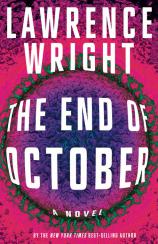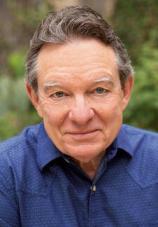The End of October
Review
The End of October
It has become common to refer to works of popular entertainment as “ripped from the headlines,” but in the case of New Yorker staff writer Lawrence Wright’s THE END OF OCTOBER, the converse is true. This terrifying account of a catastrophic influenza pandemic is eerily prescient about the world’s current war against the COVID-19 virus, bringing clarity to an understanding of some of the formidable obstacles we’re facing in navigating our way out of this crisis, while telling a vivid story.
When Henry Parsons, the deputy director for infectious diseases at the Centers for Disease Control and Prevention in Atlanta, and a skilled “disease detective,” is dispatched by the World Health Organization to the Kongoli refugee camp in Indonesia to investigate the deaths from a hemorrhagic flu of 47 young Muslim homosexual men detained there, he soon realizes the world is perched on the precipice of a disaster. What turns a dangerous, but potentially containable, problem into a catastrophe is the departure of his Indonesian taxi driver for the annual Hajj, in Mecca, where he’ll join some three million Muslims on pilgrimage. It’s only a short step from there to worldwide contagion.
"[M]uch of what makes THE END OF OCTOBER so chilling is the feeling that Wright is transcribing conversations overheard today in the White House Situation Room, not inventing scenarios months ago in the quiet of his study."
THE END OF OCTOBER follows Parsons from Saudi Arabia to an American nuclear submarine in the Persian Gulf, back to the CDC, and to the Arctic Circle, as he desperately pursues some means of arresting --- even temporarily through the development of an antibody until a vaccine is developed --- the disease’s deadly spread. Alongside this well-researched account, Wright offers glimpses of the futile response of governments, including our own, struggling to cope with the societal impact of the Kongoli flu, a disease whose swift, sizable lethality makes COVID-19 look like an annoying summer cold.
But much of what makes THE END OF OCTOBER so chilling is the feeling that Wright is transcribing conversations overheard today in the White House Situation Room, not inventing scenarios months ago in the quiet of his study. A sampling:
Lieutenant Commander Jane Bartlett, from the Public Health Service, after explaining how the country is “running out of syringes, diagnostic test kits, gloves, respirators, antiseptics, all the stuff we need to treat patients and protect ourselves,” berates the vice president:
“I know what you people want me to say, but that’s not my job, is it? I am supposed to be giving you information. Real information. What you do with it is your job. Now, if you had been doing your job and providing us with the resources we asked for, maybe we wouldn’t be sitting here sucking our thumbs while people are suffering and the economy is going to hell and the graveyards are filling up and all because people like you didn’t care enough about public health to pay attention to our needs.”
Meanwhile, Wright depicts an American society determined to “reopen” and regain some semblance of normalcy after absorbing the initial wave of the virus, as Fox News commentators are “applauding the forceful actions of the administration for stopping the disease, citing the much-criticized travel ban,” but soon descending into anarchy as it becomes clear Kongoli is surging back in a more virulent form. In this apocalyptic scenario, he juxtaposes Parsons’ efforts to find an antidote for the contagion with his own family’s struggle to cope with the deteriorating conditions of daily life in Atlanta.
True to the conventions of the genre, Wright’s novel includes an evil scientist, and an ambitious and unscrupulous national security advisor, among other villains. There are subplots about a war between Iran and Saudi Arabia and a Russian cyberattack. There’s even a cameo from the real-life Richard Clarke, the former national security official whose warnings about the threat of a 9/11-style attack went unheeded, a subject that Wright covered as a journalist in his Pulitzer Prize-winning THE LOOMING TOWER: Al-Qaeda and the Road to 9/11. Wright’s detour into the virus’s origin story --- is it naturally occurring or manufactured in a laboratory? --- feels somewhat rushed, and not as compelling as the account of the pandemic’s devastating toll and the race to limit it.
But Wright keeps the disastrous complications piling up, and the momentum of the novel flags only occasionally. Unlike some journalists who turn to fiction, his prose is refreshingly free of clichés, and he relies to a minimum on the chunks of exposition that will persuade any reader he has done his homework when it comes to subjects that include the natural history of viruses and daily life aboard a nuclear submarine.
Do you think things can’t get worse as we tentatively emerge from shutdown in the spring of 2020? Lawrence Wright will paint a grisly picture of how they can. Much worse. THE END OF OCTOBER probably should come with a trigger warning for anyone suffering from anxiety over the current pandemic. The next time --- and as Wright makes clear, there most assuredly will be one --- our country faces a similar emergency, it might make sense to summon a novelist or two to the White House to help us formulate a more effective response.
Reviewed by Harvey Freedenberg on May 1, 2020




